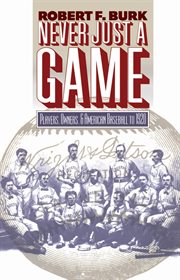Nonfiction
eBook
Details
PUBLISHED
DESCRIPTION
1 online resource
ISBN/ISSN
LANGUAGE
NOTES
America's national pastime has been marked from its inception by bitter struggles between owners and players over profit, power, and prestige. In this book, the first installment of a highly readable, comprehensive labor history of baseball, Robert Burk describes the evolution of the ballplaying work force: its ethnocultural makeup, its economic position, and its battles for a place at the table in baseball's decision-making structure. In the late nineteenth and early twentieth centuries, the growing popularity of baseball as a spectator sport and the dramatic upsurge of America's urban population created conditions that led to franchise competition, the development of rival leagues, and trade wars, in turn triggering boom-and-bust cycles, franchise bankruptcies, and league mergers. According to Burk, players repeatedly tried to use these circumstances to better their economic positions by playing one team off against another. Their successes proved short-lived, however, because their own internal divisions, exploited by management, undercut attempts to create collective-bargaining institutions. By 1920, owners still held the upper hand in the labor-management battle, but as today's sports pages show, owners did not secure a long-term solution to their labor problems."Burk proves that when it comes to baseball's money issues, the more things change--the more they stay the same.--USA Today Baseball Weekly "A lively, highly readable volume filled with fascinating anecdotes. . . . The book will appeal to both the serious student of business history and the layman with merely an interest in the game itself.--Business History America's national pastime has been marked from its inception by bitter struggles between owners and players over profit, power, and prestige. In this labor history of baseball from its beginning to 1920, Robert Burk describes the evolution of the ballplaying work force and recounts its battles for a place in baseball's decision-making structure. Tracing the development of franchise competition, rival leagues, and trade wars--and the boom-and-bust cycles, franchise bankruptcies, and league mergers they triggered in turn--he explores the off-field acrimony that characterized the sport's labor-management relations. -->
Mode of access: World Wide Web







